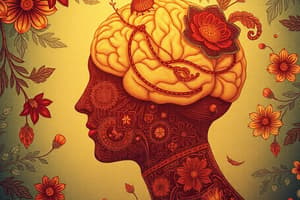Podcast
Questions and Answers
What do biopsychologists study in relation to brain injuries?
What do biopsychologists study in relation to brain injuries?
- The effects of brain injuries on sensory perception
- The effects of brain injuries on language processing
- The effects of brain injuries on behavior (correct)
- The effects of brain injuries on memory
How do researchers address aggressive behaviors when considering genetic factors?
How do researchers address aggressive behaviors when considering genetic factors?
- By focusing on genes related to language processing
- By analyzing the role of genes in sensory perception
- By studying the impact of genes on memory
- By examining how specific genes contribute to aggression (correct)
What do neuroimaging technologies like PET and MRI scans allow researchers to observe?
What do neuroimaging technologies like PET and MRI scans allow researchers to observe?
- Brain activity in real time (correct)
- Bone structure in real time
- Muscle activity in real time
- Blood flow in real time
Which of the following is emphasized by the biological perspective in neuroscience?
Which of the following is emphasized by the biological perspective in neuroscience?
How does understanding biological processes in neuroscience help researchers?
How does understanding biological processes in neuroscience help researchers?
What is a key aspect of the study of cognitive functions in relation to neuroscience?
What is a key aspect of the study of cognitive functions in relation to neuroscience?
What is the main emphasis of the biological perspective in neuroscience?
What is the main emphasis of the biological perspective in neuroscience?
How does genetics contribute to an individual's behavior?
How does genetics contribute to an individual's behavior?
Which theory proposed by Charles Darwin is related to genetics and evolution interacting within societies?
Which theory proposed by Charles Darwin is related to genetics and evolution interacting within societies?
What is neuroplasticity in the context of neuroscience?
What is neuroplasticity in the context of neuroscience?
How can epigenetic changes contribute to the development of mental health conditions?
How can epigenetic changes contribute to the development of mental health conditions?
What does the biological perspective in neuroscience help researchers understand?
What does the biological perspective in neuroscience help researchers understand?
Study Notes
Neuroscience from a Biological Perspective
Neuroscience, a field that examines the structure and function of the human brain and nervous system, has a biological perspective that emphasizes the role of genetics, evolution, and physiological processes in understanding human behavior. This perspective helps researchers to understand why individuals behave in certain ways and to identify potential interventions for mental health issues.
Genetics and Evolution
From a biological perspective, genetics play a significant role in shaping an individual's behavior. Genes passed down through generations can influence an individual's reactions to situations and their actions in different contexts. Charles Darwin founded this perspective with his theory of natural selection, which explains how genetics and evolution interact within societies. This theory proposes that certain traits are selected to be passed on, while others are not, ensuring that future generations are superior to their predecessors.
Neuroplasticity and Epigenetics
Neuroscience also considers the role of neuroplasticity, the brain's ability to change and adapt in response to experiences and environmental factors, in understanding human behavior. Epigenetic changes, which can be influenced by environmental factors, can alter gene expression and contribute to the development of mental health conditions.
Trauma to the Brain
Injuries to the brain can lead to changes in behavior, and understanding these changes from a biological perspective can help identify potential interventions. Biopsychologists study the effects of brain injuries on behavior and explore how these injuries can influence an individual's actions.
Genetic Factors
Researchers also consider genetic factors when examining aggressive behaviors. By looking at how specific genes contribute to these displays, they can develop interventions aimed at addressing the underlying biological causes.
Neuroimaging and Cognitive Function
Neuroscience also encompasses the study of cognitive functions and their relationship to brain structure and activity. Neuroimaging technologies like PET and MRI scans allow researchers to observe brain activity in real time, providing insights into how cognitive functions are related to neural systems.
In summary, the biological perspective in neuroscience emphasizes the role of genetics, evolution, neuroplasticity, epigenetics, and brain injury in shaping human behavior. By understanding these biological processes, researchers can develop interventions and treatments for mental health issues, as well as gain a deeper understanding of the complex relationship between brain structure and function.
Studying That Suits You
Use AI to generate personalized quizzes and flashcards to suit your learning preferences.
Description
Test your knowledge on the biological perspective in neuroscience, exploring topics such as genetics, evolution, neuroplasticity, epigenetics, brain injuries, genetic factors, and cognitive functions. Understand how these biological processes shape human behavior and influence mental health interventions.





